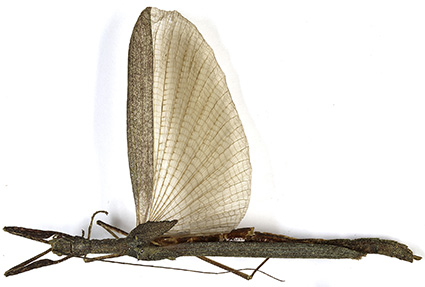Abstract
Two new species of Periphloea Redtenbacher are described based on female specimens from the Brazilian Amazon Basin, namely: P. amazonica sp. nov. (from North of Manaus, ZF-2 reserve, State of Amazonas, Brazil) and P. paraensis sp. nov. (from Eldorado dos Carajás, State of Pará, Brazil). The new species are compared to the other three species (all known from females) and a map of geographical records of the genus is provided, as well as an identification key to females of Periphloea.
References
Bradley, J.C. & Galil, B.S. (1977) The taxonomic arrangement of the Phasmatodea with keys to the subfamilies and tribes. Proceedings of the Entomological Society of Washington, 79, 176–208.
Brock, P.D., Büscher, T. & Baker, E. (2017) Catalog of Stick and Leaf Insects of the world. Ver. 5.5. Available from: http://phasmida.speciesfile.org/ (accessed 25 August 2021).
Conle, O.V., Hennemann, F.H, Bellanger, Y., Lelong, P., Jourdan, T. & Valero, P. (2020) Studies on neotropical Phasmatodea XX: A new genus and 16 new species from French Guiana. Zootaxa, 4814 (1), 1–136. https://doi.org/10.11646/zootaxa.4814.1.1
Dambros, C.S., Morais, J.W., Azevedo, R.A. & Gotelli, N.J. (2017) Isolation by distance, not rivers, control the distribution of termite species in the Amazonian rain forest. Ecography, 40, 1242–1250. https://doi.org/10.1111/ecog.02663
Fluck, I.E., Cáceres, N., Hendges, C.D., Brum, M.N. & Dambros, C.S. (2020) Climate and geograpfic distance are more influential than rivers on beta diversity of passerine birds in Amazonia. Ecography, 43, 1–9. https://doi.org/10.1111/ecog.04753
Gottardo, M. & Vallotto, D. (2014) External macro- and micromorphology of the male stick insect Hermarchus leytensis (Insecta: Phasmatodea) with phylogenetic considerations. Comptes Rendus Biologies, 337, 258–268. https://doi.org/10.1016/j.crvi.2014.02.005
Maximiano, M.F.A., d’Horta, F.M., Tuomisto, H., Zuqim, G., Van doninck, J. & Ribas, C.C. (2020) The relative role of rivers, environmental heterogeneity and species traits in driving compositional changes in southeastern Amazonian bird assemblages. Biotropica, 52 (5), 946–962. https://doi.org/10.1111/btp.12793
Oliveira, U., Vasconcelos, M.F. & Santos, A.J. (2017) Biogeography of Amazon birds: rivers limit species composition, but not areas of endemism. Scientific Reports, 7 (2992), 1–11. https://doi.org/10.1038/s41598-017-03098-w
Redtenbacher, J. (1906) Die Insektenfamilie der Phasmiden. I. Phasmidae, Areolatae. Verlag W. Engelmann, Leipzig, 151 pp.
Ribas, C.C., Aleixo, A., Gubili, C., d’Horta, F.M., Bumfield, R.T. & Cracraft, J. (2018) Biogeography and diversification of Rhegmatorhina (Aves: Thamnophilidae): Implications for the evolution of Amazonian landscapes during the Quaternary. Journal of Biogeography, 45, 917–928. https://doi.org/10.1111/jbi.13169
Santorelli Jr., S., Magnusson, W.E. & Deus, C.P. (2018) Most species are not limited by an Amazonian river postulated to be border between endemism areas. Scientific Reports, 8 (2294), 1–8. https://doi.org/10.1038/s41598-018-20596-7
Silva, J.M.C., Novaes, F.C. & Oren, D.C. (2002) Differentiation of Xiphocolaptes (Dendrocolaptidae) across the river Xingu, Brazilian Amazonia: recognition of a new phylogenetic species and biogeographic implications. Bulletin of the British Ornithologists’ Club, 122, 185–194. https://doi.org/10.1111/j.1523-1739.2005.00705.x
Silva, S.M., Peterson, A.T., Carneiro, L., Burlamaqui, T.C.T., Ribas, C.C., Sousa-Neves, T., Miranda, L.S., Fernandes, A.M., d’Horta, F.M., Araújo-Silva, L.E., Batista, R., Bandeira, C.H.M.M., Dantas, S.M., Ferreira, M., Martins, D.M., Oliveira, J., Rocha, T.C., Sardelli, C.H., Thom, G., Rêgo, P.S., Santos, M.p., Sequeira, F., Vallinoto, M. & Aleixo, A. (2019) A dynamic continental moisture gradient drove Amazonian bird diversification. Science Advances, 5, 1–10. https://doi.org/10.1126/sciadv.aat5752
Vallotto, D., Bresseel, J., Constant, J. & Gottardo, M. (2016) Morphology of the terminalia of the stick insect Dajaca napolovi from Vietnam (Insecta: Phasmatodea). Entomological Science, 19, 376–382. https://doi.org/10.1111/ens.12209
Zompro, O. (2004) Revision of the genera of the Areolatae, including the status of Timema and Agathemera (Insecta, Phasmatodea). Goecke & Evers, Keltern-Weiler, 317 pp.


